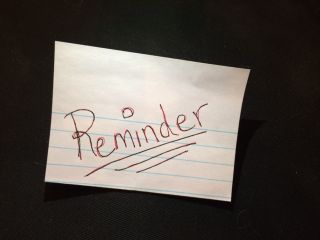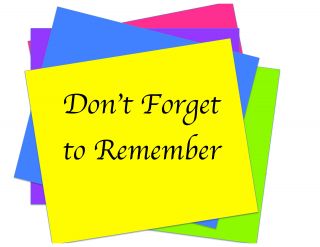
Memory is the process by which information and data is encoded, stored and retrieved. "What did I eat for breakfast this morning?" "Where did I leave my car keys?" "Who is buried in Grant’s Tomb?" "What was your name again?"
We often think about memory as a method of recalling past events. But memory isn’t just about the past.
We also need to not forget about the future. Unfortunately, most of us will not remember something that’s happened in the future (like Michael J. Fox in Back to the Future). However, much of our lives involve planning and organizing activities and setting goals for the future. When you set an intention to perform an activity or go somewhere or accomplish something in the future, you are relying on your prospective memory to help you not forget.
In many ways our prospective memory is as important as our retrospective memory. “I want to attach this document to my email.” “I need to pick up milk on the way home from work.” “I have to be at the airport by noon.” “I can’t forget about my hair appointment tomorrow.” “I plan to go for a run when I get home from work.” “I want to add yoga to my morning routine before I go to work.” “I want to become a millionaire.” All of your concrete goals, plans, hopes, and aspirations depend on a highly functioning prospective memory.
So how do we remember to remember? Dr. Gene Brewer is a memory researcher in the Psychology Department at Arizona State University. He has been focusing on this question and the prospective side of memory for many years and come up with some interesting theories and discoveries.
In general, prospective memory studies measure reaction times and accuracy of completing certain simple tasks. At the outset of the study, participants are told that a special event may occur during the task and they are to respond accordingly. The special event Is the prospective memory cue.

According to Dr. Brewer,
- Episodic memory is the collection of personal past experiences that occurred at a particular time and place. Episodic memory is an essential component in stimulating potential future contexts to enhance prospective memory. Autobiographical events including time, place and emotions play a vital role in your ability to effectively plan and achieve goals in the future. It’s easy to understand how your emotional state and preconceived notions may cloud memories of past events. Well it’s also true that emotions may also significantly impair or enhance your ability to remember future plans.
- As with retrospective memory, several types of prospective memories exist. Prospective memory is divided into time -, event - and activity-based memories. While some have proposed that these differences represent unique modalities of memory, Brewer has provided evidence that these divisions are actually based on the individual cues used to trigger a recall. For example, time-based prospective memories are triggered by a time-cue, such as stopping at the grocery store (action) at 4pm (time). Event-based memories are intentions triggered by cues such as remembering to stop at the grocery store (action) after seeing the string (event) tied around my wrist. Activity-based memories are intentions triggered by cues like remembering to stop (action) at the grocery store during the drive (activity) home from work. Do you use post it notes, lists, strings tied around your finger, or knotted handkerchiefs to remind you to do something or go somewhere in the future?
- It seems that a combination of contextual cues is most effective for supporting and enhancing prospective memory. When your intentions are multifaceted; composed of time-related cues, upcoming perceptual cues, and individualistically meaningful event or action-based cues, that all serve to activate the intention, you have a better chance at being able to execute the intention.
- Prospective memory relies heavily on cognitive control. In other words, I am delaying my behavior until a future cue, time, activity or context lets me know that I should complete my intention. What do I need to do to help me encode, store and recall this information at the right time and place? Forming effective intentions for prospective memories involves not only having a representation of the original encoding, but also a simulating representation of the future where my cue will be noticed and the target action will be carried out. Studies show that we recruit similar cortical and subcortical neural structures when we remember the past as we do when we envision the future. Our ability to envision the future action is greatly beneficial in terms of achieving the activity and realizing the delayed intention. This also has important implications for effective ways to visualize achieving goals. It supports a process-driven visualization method, rather than an outcome-driven format. In other words, envisioning how I will turn left at the intersection, park my car, and walk into the grocery store on my way home from work will probably help remind me to go to the store, more than just picturing myself with the bottle of milk at home.
- Another area of Dr. Brewer’s prospective memory research involves attention. He has shown that our ability to remember to attend to future events is significantly affected by how much we pay attention. Attention plays an enormous role in how we formulate intentions, how the intentions are perceived, and how the planned actions are eventually retrieved from memory. Dr. Brewer has also shown that no matter what type of cue you use time, event, or activity, distractions and divided attention can markedly impair prospective memory. One component of prospective memory is called working memory (some call this short-term memory). Working memory is a thinking skill that helps us stay focused, blocks out distractions and complete tasks. Working memory helps hold and process new and already stored information and is an integral element in reasoning, comprehension, and learning new information. As in prospective memory, attention control is also one of the main components of working memory.
- Studies have shown that working memory and attentiveness is improved through mindfulness training. While the specific effects of mindfulness training on prospective memory have not been investigated, an increase in attentiveness does enhance our capacity to perceive, recognize and retrieve prospective memory cues.

An important implication of prospective memory studies is that they deal with our ability to accomplish a future intention – in other words, achieve a goal. The signs, reminders, or mnemonic devices that help you remember not to forget a future intention, are also those cues that will help you achieve your goals.
What are your prospective memory devices? What techniques do you use to remember to remember?
Please check out more about Dr. Brewer’s research on Prospective Memory.
Follow me on Twitter @neilfarber.
Like the KeytoAchieve on Facebook
Check out my new website


